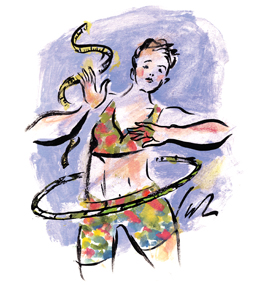Turning Points
The Fat Side of the Equation

Laurie LaFrance
by LEAH CAREY ’94
Do you have to pay extra on your taxes because you’re fat and ugly?”
It sounds like the taunt of a schoolyard bully, but in fact this question came from a woman whose only concern was to help me stop torturing myself.
To tell this story properly, let’s rewind to 1985. I was 11 years old, and I was a skinny kid. For my fifth-grade science fair, I researched scoliosis. As part of my presentation, my dad photographed me demonstrating exercises to help straighten the spine. In those pictures, you can practically see my ribs sticking out. My stomach was completely flat.
Not long after, my father told me that I was getting fat. “Your stomach looked poochy in the pictures we took for your science fair project,” he said. I believed him. For the first time in my life, I began thinking in terms of skinny and fat, and no matter what the scale or anyone else said, I fell on the fat side of the equation.
I wish I could ask my dad now what in the world he was thinking. Who says that to a little girl? How in the world could he see anything in those pictures other than a healthy, beautiful child? But I was hypnotized by his words. It wasn’t until several years after his death that I began to consider them more critically and realize that, just maybe, my father was speaking the language of crazy.
By then, I had spent 20 years believing his words so completely that I had gained weight. I believed that I was fat, so I got fat. Not terribly fat, but a good 20 to 30 pounds over the ideal weight for my frame. In my head, those 20 or 30 pounds were like 100 pounds. I was disgusted when I looked in the mirror. Getting dressed each day was an ordeal because nothing could disguise how fat and ugly I knew I was. When people said nice things to me about how I looked, I was convinced they were actually making fun of me. I was certain that I was the butt of everyone else’s jokes and that everyone was laughing at me behind my back.
In 2006, I enrolled in a two-year personal development and spiritual training program. Part of what we did was comb through our old hurts and shames, speaking them aloud and learning to see them in a different light. Which is how I came to be standing at the front of the room one day, saying, “I’m fat and ugly.”
I will be forever grateful to my teacher for how she responded that day. In that situation, many people would say, “But you’re so beautiful. Just look in the mirror and tell yourself that you’re beautiful!” But I couldn’t hear that. Instead of trying to talk me out of a belief that was so deeply ingrained, she met me head-on.
“OK, you’re fat and ugly. Do you have to pay extra to get on a bus because you’re fat and ugly? Do you have to pay extra on your taxes because you’re fat and ugly? No. If God saw fit to make you fat and ugly, then I suggest you start being the best fat and ugly person you can be.”
Those words unlocked a world of healing for me. I spent a year focusing on transforming my body image through journaling and coaching to release the old emotional logjams that had caused me to hate my body for so long. I stopped obsessing about how to lose weight and started thinking about what foods would be healthy for me. Instead of punishing myself with a gym membership I knew I wouldn’t use, I found ways to move my body that were easy and fun — like hula-hooping!
Never content to keep what I’ve learned to myself, I wrote a workbook to lead others through the same journey I had traveled. There are still days when nothing in my closet seems to fit. But more often than not, I can look in the mirror and feel OK — even happy — with what I see.
When I filled out my taxes earlier this year, there wasn’t a single question about my weight.
Leah Carey is the author of the workbook “Transforming Your Body Image.” She created and facilitates workshops across the country to help people share their stories as a vehicle for emotional healing. She writes a daily blog at www.themiraclejournal.com.
